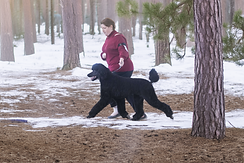

Our Goals
This page is to share information on the goals of our Working Prospects. These are the jobs we plan to work towards our dogs being repeatedly successful in. We know this will take time, and we will be one of our long term -goals-! This will be accomplished through selecting the temperament and structure for a long, healthy working life, as well as multiple stringent evaluations, and lifelong follow through and assessments to measure their success. If you are interested in a Prospective Candidate for any of these Jobs please reach out, we would love to talk with! Just be patient with us, these are marathon goals, not litter specific.

Service Dogs
A Service Dog is any dog that is Task Trained to Mitigate a Disability or Symptoms of a Disability for their individual handler. They will be able to pass a Public Access Assessment in order to be sound, safe, and a functional working dog in public environments. A Service Dog is allowed in all public areas with limited exceptions.
Service Dogs are the Foundation Jobs of our program, it was through our foundation girls who are working girls for us, that this passion for Working dogs has really formed.
We will emphasize Scent Based Tasks such as Diabetic Alert, Mobility (Counter Balance through light pulling), and Psychiatric Tasks (Including PTSD) in addition to working in Public.
We work off the International Association of Assistance Dogs Partners and of course the Americans With Disabilities Act to measure our Prospects. We look for dogs with a High Biddability, Handler Focus, Strong Resilience, and Persistence as some foundation traits.

Therapy Dogs
A Therapy Dog is a Pet Dog who is Trained with their Owner-Handler and Licensed, Insured and Certified through an Organization that works within Hospitals, Long-Term Care Facilities, Schools, Libraries and similar locations coordinated by the individual Organization.
Therapy Dogs were not an original goal, but through the relationships we made with our first ever liter, we realized how much potential we have in serving in this role as well. We had three quickly pass with an Organization, with several more who had the same temperament traits. This has opened us up to making notes and assessing not only if the individual dog has the Calm, Quiet, Social nature needed for Therapy Work, but also how this dog would enjoy such a job. Poodles are known for being one of the more reserved Hunting breeds, preferring their own people to the company of strangers, but this does not exempt them from the occasional individual being more inclined to a variety of people, or children. The low shedding and thick hair also lend them to being a comfort to individuals usually unable to interact with dogs.
For Our Therapy Prospects we look at Biddability, Sociability, Curiosity, Outgoing and environmental Confidence. We model off of the Therapy Dogs International for these job assessments.

Facility Dogs
A facility dog is a specially trained dog that works with a professional in a non-profit or government setting. The dog must be trained to do specific, skilled tasks in a variety of different situations within the facility environment with multiple clients; it must be more than just a presence within the facility.
The idea for Facility Dogs actually came from an interview heard in a podcast. This is a fascinating and helpful new job that is still growing within the United States. Some examples of facilities include Schools, Doctor Offices, Legal Buildings, Long Term Care Facilities, and Funeral Homes.
They are a unique combination of Service and Therapy dog in many ways, being trained to perform similar tasks and tricks of both, but in order to benefit multiple people, while having one primary handler and owner, with whom they live and who is responsible for their daily care, both mentally and physically.
These dogs have a lot asked of them mentally, so when we feel we have a dog that has the Sociability, Resilience, Handler Focus, and the level of Independence to not be burdened by the feelings placed upon them, we will have them assessed further to see in which capacity they would thrive.

Emotional Support Animal
An Emotional Support Animal is any animal that provides emotional support alleviating one or more symptoms or effects of a person’s disability. Emotional support animals provide companionship, relieve loneliness, and sometimes help with depression, anxiety, and certain phobias, but do not have special training to perform tasks that assist people with disabilities.
This is a Sensitive subject for many, but we do feel there are individuals who benefit from an Obedient and Sociable companion to aid in their Emotional and Mental Health in the home. While by legal definition an ESA needs neither training or to be of any particular caliber, we strongly feel that the most benefit is gained through a strong relationship with a Calm, Affectionate, and biddable, low drive companion who can easily meet the requirements set forth by the American Kennel Club's Canine Good Citizen Test.
When specifically looking to match a dog with a partner requesting an ESA, we look at Handler Focus, Prey Drive, Energy level, and Contact Sensitivity foremost. Preferring those with a lower prey drive, and higher desire for physical contact.